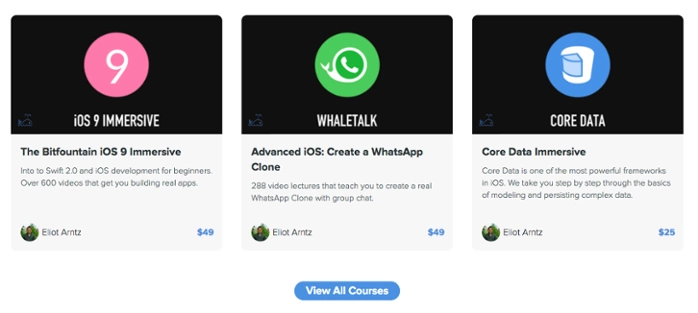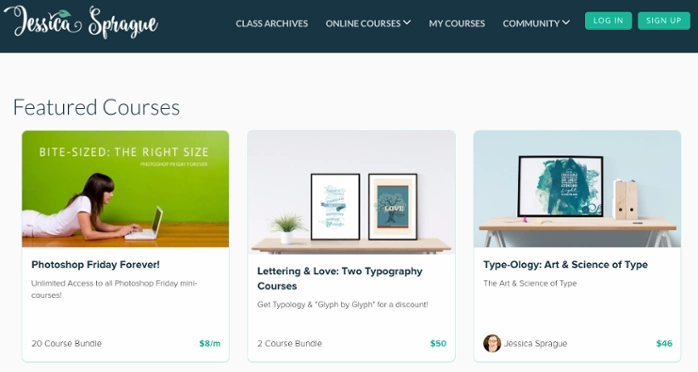4 myths about online course creation


Digital content creation for your online course quite literally has the power to change your life. They give people of all backgrounds and talents the power to take their businesses online, transform their income, and be their own bosses. There are so many incredible benefits that come from teaching online, yet there are still some skeptics.
Would-be course creators tend to have the same few reservations holding them back from taking the plunge and finally creating their first online courses. That’s why I’m debunking a few of the most common course creation myths.
Watch the video or scroll down to read about the online course myths:
Online course myth 1: The expert myth
The expert myth says, “I can’t teach about my passion because I’m not an expert. I don’t have the credentials or it’s not my day job.”
We hear this all the time here at Teachable, and every time we have the same response:
We like to say that an expert is someone who’s just one step ahead of you, and if you look at the dictionary definition, it actually says that an expert is”someone who’s gained knowledge or skills from experience.” It has nothing to do with credentials, your day job, or how you spend your time.
I want you to meet John and Eliot, who created an online course called Bitfountain and made over 2 million dollars on it. Were they experts? I bet you can guess what I’m going to say.
Absolutely not.
In fact, their course is on iOS 7 programming and they themselves had just learned the material. They weren’t experts. They weren’t even professional developers. They had never been teachers, and they had never made a course. The fact is, these guys are probably better than what you think of as an expert. And they’ve used their expertise for digital content creation in their very own online courses


The thing about experts
There are some “experts” who have been teaching in their field for decades and the truth is that they no longer relate to the student they’re teaching anymore. They no longer remember the pain points they dealt with when they were learning 30 years ago when they were creating digital content for online courses. The things that you’re struggling with are so second nature to them that they don’t think to address them.
Someone who’s just learned the material connects with students and understands those common pain points, and those are the things that people really need to know.
When you’re a beginner, you want someone who’s connecting with you, who can explain in a way that’s easy what’s going on and how to fix it. That’s what makes someone who’s recently learned a better teacher than someone who may have credentials, a title, or any of those other fancy anarchic things that make you think someone’s an expert.
Online course myth #2: The trend myth
The trend myth is the idea that you have to pick a course topic that’s trendy or popular. This is more common than we thought.
For example, someone commented on one of our Teachable blog posts, “Hey, do I have to teach about courses? So many profitable courses I see teach on this material. Is that what I should focus on?”
The answer is absolutely not.
The whole idea of a course is to connect your skills and your passions to the marketplace.
You’re doing yourself an injustice if you try and pick something that’s trendy for your online course. Make sure you do have an audience, but also balance that with what you know you want to teach.
Be true to you
Another one we hear all the time is programming. You definitely don’t have to teach about programming to be successful. In fact, there’s a course out there that teaches how to implement Michael Hyatt’s WordPress theme.
There’s nothing more niche than that, but at the same time, the person who digital created content for this online course had that skillset, found the niche, found the audience, and made thousands of dollars on this course.
In essence, what I’m saying is definitely do not pick your course topic because it’s popular and popular only.
Online course myth #3: The competition myth
Maybe you’re ready to get started, but you realize that there are two, three, or even twenty online courses already covering your topic. You might think, “Oh, no. I shouldn’t teach on that! There’s too much competition. I’ll never be able to keep up.”
Believe it or not, competition is a good sign. It means people are interested in your topic. On the other hand, if there’s absolutely no competition for your online course, that probably means that there’s no audience. If there are no blogs about your topic, it probably doesn’t have a large group of people that you’ll be able to sell to.
If there is competition, that means there are people willing to pay for your course.
It can be healthy
Finding competition around your topic is a good thing, but you shouldn’t go and pick your course topic because it’s well-known and because everyone else is teaching on it. Seeing other people teach on your topic is a great sign, but this isn’t how you should choose your course.
You should also keep in mind that people often buy online courses because of the instructor. They feel connected to you, your brand, and your journey to get where you are. By building your own audience and making a connection with them, you can assure that they’re going to want the course that you’re teaching.
Online course myth #4: The profitable topics myth
The last myth we’re going to talk about is the profitable topics myth. This myth says that there are only certain topics out there that are profitable. This comes from the idea that there are two types of skills, hard skills and soft skills.
Hard skills tend to be something we associate with the left brain, programming, algebra, engineering, finance, and soft skills we associate with the right brain or our more artistic side, lifestyle courses, watercolor painting, writing, the creativeness.
Here at Teachable, we really believe that thinking about these skills is two different subsets. It’s totally dangerous. We, as people, use all of our brains, so this kind of thinking is very dangerous because it leads to two common misperceptions.
The first of these is that hard skills will make people money, and that way, you can charge more for your course. If I teach something like finance and how to trade stocks, I can say, as a consumer, “Okay, I might make $1,000 if I take this course. The course itself only cost $100. I’m willing to pay that.”
Learning from others
Conversely, when you have something like a soft skill, like watercolor painting, that has no value. What do I know that that’s going to make me money, so I can’t charge a lot for that. At the end of the day, people start to think that they can only make money by teaching a hard skill, like finance or programming or something that directly makes people money. First of all, there’s no such thing as an unprofitable topic area of teaching.
Let’s look at Jessica Sprague. She has over 80,000 students and teaches online digital scrapbooking. That’s a soft skill. That’s creative, but she’s extremely successful. Then you have someone like Ryan Leslie who teaches The Future of Music Business School or Asad Chaudhry who teaches card magic. What’s more ambiguous and mysterious than that? These are all incredibly successful course creators.


We have a free “ultimate guide to online course creation” to help you put together your launch strategy and set your business up for success.
Working your way up
It is somewhat easier to justify charging a lot of money if your course directly makes someone money. I know that if I learn to become a developer, I’m going to make $50,000 more every year in my new job, my new title, and so I’m willing to pay $2,000 for a course. On the opposite end of the spectrum, something like learning to meditate may not directly make me money in the same way, so it is hard to justify and convince someone the benefits of meditation that might be worth $2,000.
Instead, you’re going to charge a smaller amount, like maybe $150. The thing to remember is at the end of the day, you can make the same amount of money on both types of courses. Try to keep focus on digital content creation for your online course. Keep the passion alive as you work and things will turn out for the best.
Soft skills and artistic skills apply to a broader range of people, so it’s much easier to sell to a greater number of people. Selling more units at a lower price equals selling fewer units at a higher price.
Money cross-genre
It’s definitely possible to make an equal amount of money in both genres, but wait. Of course, as in anything, there’s an exception. We’ve seen people make just as much money on a soft skill as they have on a hard skill. People care about health, happiness, and relationships.
Anyone who’s in marketing knows that tapping into these things is a great profitable area. What matters more to us than our happiness and our health and our relationships? It’s who we are.
All in all, just because you’re teaching some of these things does not mean you have to charge a low amount.
Balance it
Find your balance between the two. Digital content creation online course can be daunting enough. The key to this is providing a very clear transformation. We talked about how your transformation should tell people exactly what they’re getting out of the course.
If you can convince someone that your health and wellness course will save them X amount of dollars in doctor’s fee, that’s incredibly valuable. Overall, if you’re selling a relationship course that will genuinely save a marriage, you can charge a lot for that.
